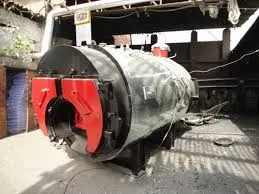
Jan . 21, 2025 05:34 Back to list
Gas (oil) fired steam boiler


Limitations A system boiler requires space for a hot water cylinder, which might not be feasible in homes with limited storage. Additionally, system boilers aren't instantaneous; once the hot water in the cylinder is depleted, it takes time to reheat. Conventional Boilers Conventional boilers, also referred to as traditional, standard, or heat-only boilers, are the oldest type of boiler used in homes with an existing open-vented central heating system. They require a hot water cylinder and a cold water storage tank. Advantages 1. Meeting High Hot Water Demand Designed to deliver hot water to multiple outlets at the same time, conventional boilers are ideal for properties with large spaces or several bathrooms. 2. Compatibility with Old Systems Homes with older radiator systems often benefit from the operational pressures of conventional boilers. 3. Backup Hot Water Supply With an immersion heater, these systems offer an alternative hot water supply if the main boiler breaks down. 4. Potential for Renewable Energy Integration Conventional systems can be paired with solar thermal systems, enhancing overall energy efficiency. Limitations The requirement for a hot water cylinder and cold water tank demands more space, making these systems less viable in small properties. Installation can be extensive and expensive compared to other boiler types, and they may experience heat loss from the hot water cylinder. Selecting the right boiler depends on numerous factors, including the size of the property, the number of bathrooms, and the specific hot water and heating requirements. Combi boilers suit compact living spaces with lower water demands, while system boilers accommodate homes demanding higher hot water volumes without the need for a loft. Conventional boilers serve larger properties with substantial hot water requirements, supporting multiple users simultaneously. Reliability, energy efficiency, and suitability to your current heating infrastructure are also significant contributors when making a decision. Consulting a qualified heating engineer can provide tailored advice to ensure the chosen boiler aligns with both present and future needs, securing an efficient and cost-effective heating solution. In conclusion, understanding the distinctions between combi, system, and conventional boilers empowers homeowners and businesses alike to make informed decisions, enhancing the efficiency and reliability of their heating systems.
-
Comprehensive Guide to Steam Boiler Installation Diagram – Global Best Practices and Future Trends
NewsNov.24,2025
-
A Practical Guide to the Selection of Steam Boiler for Industrial Efficiency
NewsNov.23,2025
-
Comprehensive Guide to Steam Boiler PDF Manuals and Their Global Impact
NewsNov.22,2025
-
Discover How Steam Boiler Videos Improve Industrial Training & Safety
NewsNov.22,2025
-
Comprehensive Guide to Wood Fired Steam Boiler Design – Efficiency, Applications, and Innovations
NewsNov.21,2025
-
Comprehensive Guide to Steam Boiler Working – Efficiency & Applications
NewsNov.20,2025
Related PRODUCTS






















